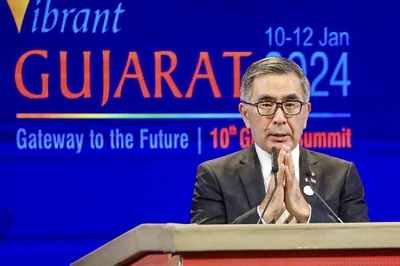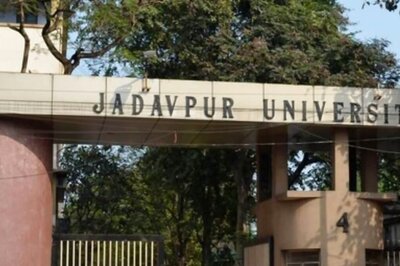
views
Can reducing the meat consumption, empowering the tribal communities and protecting the natural forests help fight global warming? A report prepared by an alliance of more than three dozen civil society groups — working in the field of climate change and sustainability — stresses on strengthening the community and indigenous land rights, restoring forests and ecosystems and transforming agriculture to changing food habits.
This report has come out at a time when the Intergovernmental Panel on Climate Change (IPCC) has said that the earth is heating much faster than we had expected and we face an uphill task of keeping its temperature below the threshold of 2 degree Celsius. While the special report of IPCC on 1.5 degree Celsius (SR1.5) is a grim reminder of the challenge we face to deal with global warming, the report by Climate Land Ambition and Rights Alliance (CLARA) — a group of 38 NGOs — triggers a debate on the modus operandi of governments to deal with the problem as well as the lifestyle and eating habits adopted by rich nations.
India played an important role during climate negotiations to include a language around sustainable consumption and lifestyle in the preamble of the Paris agreement signed in 2015. However, experts say not much is being done to translate the language of the agreement into action. Now as IPCC report has warned that at current rate of emission, the world will be 3 to 4 degree warmer than pre-industrial level by the end of 21st century. The political leaders, however, are oriented towards keeping the temperature rise below 2 degree Celsius.
Scientists have concluded that climate change induced by global warming is causing extreme weather conditions like frequent floods, powerful cyclones and prolonged and repeated droughts. It is a serious concern for a country like India which has thousands of glaciers and a vast coastline where almost 300 million people live along the shoreline. India also has varied geographical regions making it more susceptible to climate change. Therefore, it is an imperative for India that the temperature rise should be kept under check.
According to IPCC, we have only 12 years’ time if we want to keep the average global temperature within 1.5 degree Celsius and for that we will have to cut down the total emissions by at least 45% over 2010 levels by 2030 and a “net zero” carbon emission has to be achieved by 2050. Forests and oceans are the natural sinks which absorb the carbon from space to prevent the trapping of heat. At the present rate of emission, it is not possible for this “natural sink” to clean enough carbon to keep the emissions at “net zero”.
Several new methods such as combining the bioenergy with carbon capture and storage (CCS) are suggested to remove carbon from space. This method of combination of bioenergy and CCS is known as BECCS and feasibility of such technologies is still debatable. The CLARA report challenges the very notion such technologies as they are still “not proven.”
"We have the solutions already. We don’t need to sit around waiting for new technologies to be invented,” says contributing author of the report, Teresa Anderson who is also climate change policy officer at ActionAid International.
"Even if the technical hurdles for geoengineering and BECCS are addressed, they could still have disastrous social or environmental consequences. Some models anticipate that BECCS would require replacing hundreds of billions of hectares of farmland and forests with bioenergy tree plantations, pushing people off their land, leading to food price rises, and driving deforestation. Instead of solving climate change, hunger and injustice, BECCS could make these problems much, much worse," adds Anderson.
The fact of the matter is that the world cannot emit more than 580 gigaton of CO2 during the century but this budget will be consumed in next 12 years at the current rate of emissions. On the other hand, the world’s meat production has quadrupled in the last 55 years — from around 78 million ton in 1963 to 330 million ton in 2018.
Industrial meat production is another area where carbon footprint can be reduced. Rich countries like US, EU, Australia, Canada and China produce and consume most of it. The total greenhouse gas (GHGs) emission by meat industry is around 15% which is equivalent to the total GHGs emission by vehicles. Industrial meat production is projected to increase sharply in coming years and this is a cause of worry.
CLARA report also stresses on land rights to tribal communities and protection of ecosystems and natural forests. The data present in the report say more than 290 gigatons carbon is stored in the indigenous and community lands across 64 countries. It also claims that almost 15 gigatons carbon emission will be reduced (sequestered or avoided) every year by 2050 if we care about forests and ecosystem.
India clearly has a lesson from this report as tribals constitute around 10% of its population. The forests are “under threat” and tribal community often denied their right over forest land and resources. The flouting of rules in mining is rampant and results into dislocation of forest dwellers from their land. The recent example is a large-scale tree felling for Char Dham Yatra project in Uttrakhand. The matter was challenged by activists in national green tribunal (NGT) for not obtaining any environmental clearance. After a long hearing the case is now being heard by Supreme Court. Another proposed deforestation in the Terai region of Uttar Pradesh where more than 50,000 trees will be cut for a road project cutting through Dudhwa national park.
It is evident that the commitments made in the Paris Agreement on climate change and in subsequent summits need to be enhanced dramatically and equitably by all countries, including India. Words alone will not save people and the planet.




















Comments
0 comment